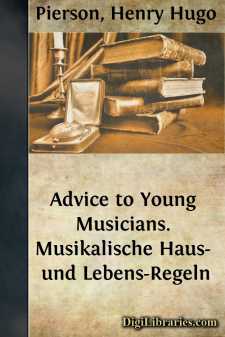Categories
- Antiques & Collectibles 13
- Architecture 36
- Art 48
- Bibles 22
- Biography & Autobiography 813
- Body, Mind & Spirit 141
- Business & Economics 28
- Children's Books 12
- Children's Fiction 9
- Computers 4
- Cooking 94
- Crafts & Hobbies 4
- Drama 346
- Education 46
- Family & Relationships 57
- Fiction 11826
- Games 19
- Gardening 17
- Health & Fitness 34
- History 1377
- House & Home 1
- Humor 147
- Juvenile Fiction 1873
- Juvenile Nonfiction 202
- Language Arts & Disciplines 88
- Law 16
- Literary Collections 686
- Literary Criticism 179
- Mathematics 13
- Medical 41
- Music 40
- Nature 179
- Non-Classifiable 1768
- Performing Arts 7
- Periodicals 1453
- Philosophy 64
- Photography 2
- Poetry 896
- Political Science 203
- Psychology 42
- Reference 154
- Religion 513
- Science 126
- Self-Help 83
- Social Science 81
- Sports & Recreation 34
- Study Aids 3
- Technology & Engineering 59
- Transportation 23
- Travel 463
- True Crime 29
Advice to Young Musicians. Musikalische Haus- und Lebens-Regeln
Categories:
Description:
Excerpt
The cultivation of the Ear is of the greatest importance.—Endeavour early to distinguish each several tone and key. Find out the exact notes sounded by the bell, the glass, the cuckoo, etc.
Practise frequently the scale and other finger exercises; but this alone is not sufficient. There are many people who think to obtain grand results in this way, and who up to a mature age spend many hours daily in mechanical labour. That is about the same, as if we tried every day to pronounce the alphabet with greater volubility! You can employ your time more usefully.
There are such things as mute pianoforte-keyboards; try them for a while, and you will discover that they are useless. Dumb people cannot teach us to speak.
Play strictly in time! The playing of many a virtuoso resembles the walk of an intoxicated person. Do not take such as your model.
Learn betimes the fundamental principles of Harmony.
Do not be afraid of the words Theory, Thoroughbass, Counterpoint, etc.; you will understand their full meaning in due time.
Never jingle! Play always with energy and do not leave a piece unfinished.
You may play too slow or too fast; both are faults.
Endeavour to play easy pieces well and with elegance; that is better than to play difficult pieces badly.
Take care always to have your instrument well tuned.
It is not only necessary that you should be able to play your pieces on the instrument, but you should also be able to hum the air without the piano. Strengthen your imagination so, that you may not only retain the melody of a composition, but even the harmony which belongs to it.
Endeavour, even with a poor voice, to sing at first sight without the aid of the instrument; by these means your ear for music will constantly improve: but in case you are endowed with a good voice, do not hesitate a moment to cultivate it; considering it at the same time as the most valuable gift which heaven has granted you!
You must be able to understand a piece of music upon paper.
When you play, never mind who listens to you.
Play always as if in the presence of a master.
If any one should place before you a composition to play at sight, read it over before you play it.
When you have done your musical day's work and feel tired, do not exert yourself further. It is better to rest than to work without pleasure and vigour.
In maturer years play no fashionable trifles. Time is precious. We should need to live a hundred lives, only to become acquainted with all the good works that exist.
With sweetmeats, pastry and confectionary we cannot bring up children in sound health. The mental food must be as simple and nourishing as the bodily. Great composers have sufficiently provided for the former; keep to their works.
All bravura-music soon grows antiquated. Rapid execution is valuable only when used to perfect the performance of real music.
Never help to circulate bad compositions; on the contrary, help to suppress them with earnestness.
You should neither play bad compositions, nor, unless compelled, listen to them.
Do not think velocity, or passage-playing, your highest aim. Try to produce such an impression with a piece of music as was intended by the composer; all further exertions are .
Think it a vile habit to alter works of good composers, to omit parts of them, or to insert new-fashioned ornaments. This is the greatest insult you can offer to Art.
As to choice in the study of your pieces, ask the advice of more experienced persons than yourself; by so doing, you will save much time.
...

